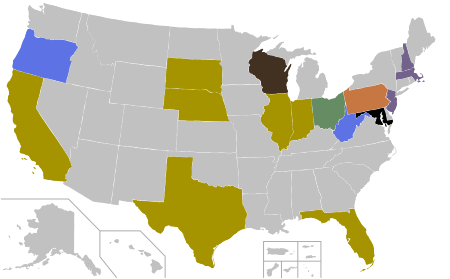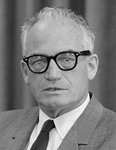Republican Party presidential primaries, 1964
|
|
|||||||||||||||||||||||||||||||||||||||||||||||||||||
|---|---|---|---|---|---|---|---|---|---|---|---|---|---|---|---|---|---|---|---|---|---|---|---|---|---|---|---|---|---|---|---|---|---|---|---|---|---|---|---|---|---|---|---|---|---|---|---|---|---|---|---|---|---|
|
|||||||||||||||||||||||||||||||||||||||||||||||||||||
|
|||||||||||||||||||||||||||||||||||||||||||||||||||||

Gold denotes a state won by Barry Goldwater. Blue denotes a state won by Nelson Rockefeller. Brown denotes a state won by John W. Byrnes. Green denotes a state won by James A. Rhodes. Purple denotes a state won by Henry Cabot Lodge, Jr. Orange denotes a state won by William W. Scranton. Grey denotes a state that did not hold a primary.
|
|||||||||||||||||||||||||||||||||||||||||||||||||||||
|
|||||||||||||||||||||||||||||||||||||||||||||||||||||
The 1964 Republican presidential primaries were the selection process by which voters of the Republican Party chose its nominee for President of the United States in the 1964 U.S. presidential election. Senator Barry Goldwater of Arizona was selected as the nominee through a series of primary elections and caucuses culminating in the 1964 Republican National Convention held from July 13 to July 16, 1964, in San Francisco, California.
The Republican Party rebounded in the early 1960s from its 1958 disaster. In 1960, the party gained nineteen House seats and two seats in the Senate. Although the Republicans took the Texas Senate seat vacated by Lyndon B. Johnson's Senate election to the Vice-Presidency in a 1961 special election (won by John Tower), they lost a special election in New Hampshire. The midterm election of 1962 disappointed the party; it only gained three seats in the U.S. House and actually lost three in the Senate. However, the party gained governorships in Pennsylvania, Ohio, and Michigan.
As the year 1963 opened, several Republicans were named as potential candidates. One was New York Governor Nelson Rockefeller, who had just been re-elected in 1962. Rockefeller visited Republicans in the Midwest in the spring of 1963 to see how they would respond to his candidacy. He was encouraged by the response. Former Governor Goodwin Knight of California opened a Rockefeller campaign office in California, but Rockefeller convinced him to close it on March 29 until he had decided to run. Rockefeller's popularity declined when he remarried on May 4 after being divorced the previous year. The Republican Citizens Committee, a caucus of moderate Republicans, had decided by July 16 not to support Rockefeller. Rockefeller plowed ahead anyway, and on September 16 he announced that former Gov. Hugh Gregg of New Hampshire was on his team to help direct his efforts in the first primary.
...
Wikipedia






